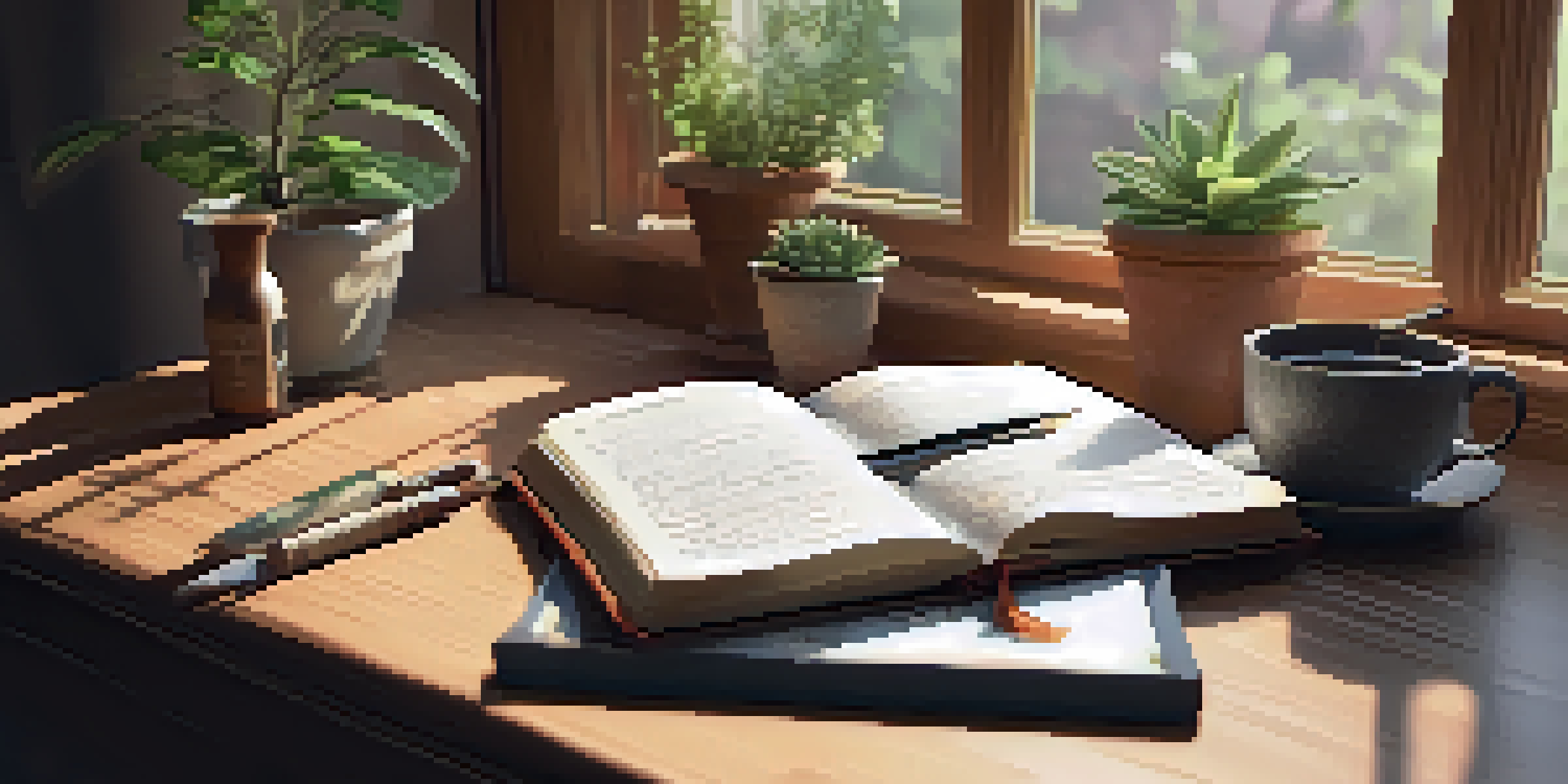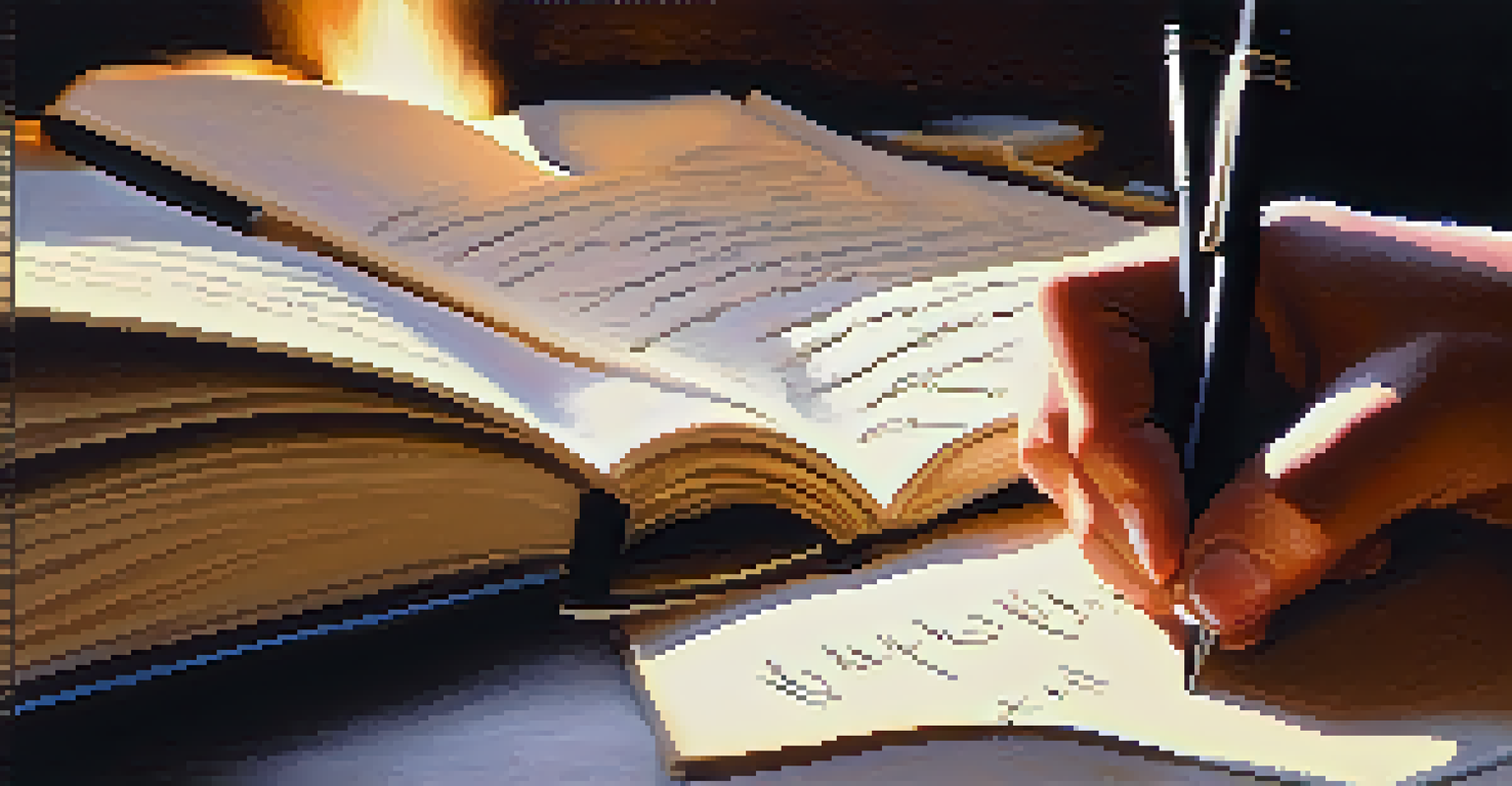Documenting Hallucinogenic Experiences Through Journaling

Understanding Hallucinogenic Experiences and Their Impact
Hallucinogenic experiences can be transformative, providing insights that go beyond ordinary perception. These experiences often evoke strong emotions and vivid imagery, making them both fascinating and complex. Understanding their impact is crucial for personal growth and self-reflection, as they can illuminate aspects of our psyche that we might not usually confront.
The unexamined life is not worth living.
The nature of these experiences can vary widely, influenced by factors such as the substance used, the setting, and the individual's mindset. Each journey can feel like a unique adventure, often leading to profound realizations about oneself and the world. Therefore, documenting these experiences can help individuals process their feelings and thoughts more effectively.
By keeping a record of these moments, individuals create a personal narrative that can be revisited and reflected upon later. This documentation serves as a valuable tool for understanding the lessons learned during these often intense experiences, creating a bridge between the subconscious and conscious mind.
The Benefits of Journaling During and After Experiences
Journaling can significantly enhance the understanding of hallucinogenic experiences by capturing fleeting thoughts and feelings. During the experience, writing can help ground the individual, providing a way to anchor their thoughts amidst the chaos of new perceptions. This immediate reflection can lead to insights that might otherwise fade once the experience concludes.

After the experience, revisiting the journal entries allows for deeper analysis of the thoughts and emotions expressed. It offers an opportunity to connect the dots, revealing patterns and themes that emerge during these journeys. This post-experience reflection can be instrumental in integrating the insights gained into everyday life.
Transformative Nature of Experiences
Hallucinogenic experiences can provide profound insights that facilitate personal growth and self-reflection.
Moreover, the act of writing can be therapeutic, providing an outlet for any lingering emotions or confusion. It empowers individuals to articulate their experiences in a structured way, which can lead to healing and personal growth.
How to Start Your Journaling Practice
Starting a journaling practice doesn’t have to be daunting; it can be as simple as setting aside some time each day to write. Choose a comfortable space where you feel relaxed and free to express yourself. The goal is to create a safe environment that encourages honesty and openness in your writing.
Writing is a way of talking without being interrupted.
You might want to begin with a few prompts to get the creative juices flowing. Questions like, 'What do I hope to learn from this experience?' or 'How do I feel right now?' can help guide your thoughts. Remember, there's no right or wrong way to journal; the key is to let your thoughts flow naturally onto the page.
As you become more comfortable with the process, you can experiment with different styles, whether it’s free writing, structured entries, or even doodling. The important thing is to find a method that resonates with you and encourages ongoing reflection.
Choosing the Right Time to Journal
Timing can significantly affect the quality of your journaling practice. Many find it beneficial to journal both during and after a hallucinogenic experience to capture immediate thoughts and later reflections. However, it’s equally important to set aside time for journaling in the days following an experience, as insights may continue to surface long after the effects have worn off.
Consider establishing a routine where you dedicate specific times for journaling. This could be in the morning, to reflect on the previous day, or in the evening, to unwind and process the day's events. Creating a habit around journaling can help solidify its importance in your life and encourage regular self-reflection.
Benefits of Journaling Insights
Journaling during and after hallucinogenic experiences captures fleeting thoughts, aiding in understanding and integration of insights.
Additionally, be mindful of your emotional state when choosing to journal. If you’re feeling overwhelmed or confused, it may be beneficial to give yourself some space before returning to your journal. This way, you can approach your reflections with a clearer mind and a more balanced perspective.
Techniques for Effective Journaling
There are various techniques you can employ to make your journaling more effective. One popular method is stream-of-consciousness writing, where you jot down thoughts as they come to you without worrying about grammar or structure. This can be particularly useful during hallucinogenic experiences, as it allows you to capture the essence of your thoughts in real-time.
Another technique is to use sensory details to enhance your entries. Describe what you saw, felt, heard, and even smelled during your experience. By immersing yourself in the details, you create a richer narrative that can be revisited later, allowing for deeper reflection and understanding.
Lastly, consider incorporating visual elements, such as drawings or sketches, into your journal. Art can express feelings that words sometimes cannot, providing another layer of exploration. This multi-faceted approach can make journaling a more engaging and fulfilling practice.
Creating a Safe Space for Your Journaling
Creating a safe space for journaling is essential to encourage honesty and vulnerability in your writing. This could be a physical space, such as a cozy corner in your home, or a mental space where you feel free to express your thoughts without judgment. Make your journaling environment as comfortable as possible to foster creativity and reflection.
Consider personalizing your space with items that inspire you, such as candles, plants, or art. Surrounding yourself with elements that bring you joy can enhance the journaling experience, making it feel more inviting and special. This personal touch can also help establish a routine, signaling to your mind that it’s time to reflect and write.
Creating a Safe Journaling Space
Establishing a comfortable and private environment for journaling encourages honesty and deeper exploration of thoughts.
Additionally, ensure your journaling practice remains private and confidential. Knowing that your thoughts are secure can encourage deeper exploration and honesty. This sense of safety will empower you to write freely, without the fear of how your words might be perceived by others.
Reflecting on Your Journaling Journey
As you continue your journaling practice, take the time to reflect on your journey as a whole. Look back at your entries and notice any patterns or recurring themes that emerge over time. This reflection can provide valuable insights into your personal growth and the evolution of your thoughts and feelings.
Consider setting aside specific times to read through your previous entries, allowing yourself to see how far you've come. This can be an empowering experience, reminding you of the progress you've made and the lessons you've learned. It can also reignite your motivation to keep journaling.

Lastly, remember that journaling is a personal journey, and it's important to be patient with yourself. Each entry is a step in your exploration of self-discovery, and every experience contributes to your understanding of yourself and your hallucinogenic adventures. Embrace the process and allow it to unfold naturally.